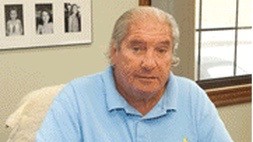Where Did ‘Nice’ Go on Key Biscayne?
Charles D. ShermanMay 26, 2020

Sam Brickle is an advocate for golf cart safety on Key Biscayne (Key News via thebricklegroup.com)
“SEAT BELTS!!!!”
If you’re driving a golf cart on Key Biscayne and you hear somebody bellowing “SEAT BELTS,” there is a fair chance you have just passed 82-year-old Sam Brickle, a sort of island vigilante out to see that laws are obeyed.
Brickle is angry not only about untethered seat belts but also more importantly that youngsters not old enough to drive are often behind the wheel of the carts, and not always being safe. His desire to see Key Biscayners follow the rules became public when a note he originally sought to present at a Village Council meeting was printed last month in the Islander News.
It set off a divisive firestorm because Brickle in his note pointed to “certain cultures that do not have to abide by these rules.” It was clear to many who read the letter that Brickle was writing about Key Biscayne’s Latin community.
Throwing gasoline on the fire, Brickle continued: “This is also true of domestic conflicts where the husband is allowed to beat the crap out of his wife.” Finally, addressing Police Chief Charles Press, Brickle wrote: “Chief, please don’t allow these people to hide behind their former culture.”
Another letter writer quickly lent Brickle support. Paul O’Leary, an island resident for 36 years, wrote that he had seen many changes on Key Biscayne. “The most obvious is the attitude the rules don’t apply to me,” wrote O’Leary. “I tend to agree with Mr. Brickle that as more Latin people have inhabited our island this attitude has exploded.”
The response was immediate and furious. Natalie Del Cueto unleashed a singeing retort saying O’Leary’s letter was a “racist, arrogant article that aggressively attacks the Latin culture, generalizing all Latinos and our culture by accusing us of not abiding by the rules.”
Gustavo Tellez also denounced Brickle and O’Leary. “Suddenly all residents of Key Biscayne who are of ‘Latin’ descent are guilty of inappropriate behavior. Shame on us for not living up to your standard.” Tellez went on to quote extended portions of the Bible to make his point.
In an interview, Brickle said: “My bitch is kids running all over in carts,” adding the problem of unenforced laws starts and ends with Chief Press and his force, which appears leery of ticketing juveniles.
Brickle, a forceful presence, is the former president of a family-run textile business in Rhode Island. He’s been a Key Biscayne snowbird for 20 years. Worldly, used to success and getting his way, he now says he owes the island’s Latin community an apology.
“I did not make myself clear in my previous statement,” Brickle declared. “It was not my intention to offend the Latin community.”
His complaint centers on what he says he heard from Chief Press at a recent town hall meeting. “He said that his department has to understand and be conscious of different cultures and customs of other countries where our residents are from.”
But Brickle draws a line when it comes to flouting rules of the road and domestic violence.
“Please don’t shoot the messenger!” Brickle protested.
Asked about the claims, Press strongly objected and said that Brickle didn’t understand his view.
“A lot of people here come from countries where the rules of the road are survival,” Press said in an interview. “In Argentina, Venezuela and these strong-arm countries, if you’re wealthy and stop at a stop sign, you can get kidnapped.”
He said there was a “fine balance between a police state and encouraging better parenting.” His policy, he said, is for his officers to use discretion in dealing with the public, enforcing the law by way of ticketing, arrests, warnings or simply communication.
“If we arrest everybody who commits a [driving] violation, nobody would have a license,” Press said.
As for enforcement, statistics from 2019 and 2020 show police stopped 307 golf carts. They handed out 135 citations and 172 warnings.
The numbers do not “differentiate juveniles from adults because we haven’t tracked it that way,” Press said. “We will do so in the future and that will provide everyone with a better snapshot of what we do and how we do it.”
At the same time, Press rejects Brickle’s view that he had suggested that running a stop sign, not wearing a seat belt or driving under-age is a cultural issue. “I’m not going there,” the chief said.
What the chief calls discretionary policing, Brickle sees as far too light a touch.
The Village Council has repeatedly directed the police department to crack down on under-age drivers. There is scant evidence of corrective steps, according not only to residents such as Brickle, but also to current and former Council members.
Village Vice Mayor Brett Moss said the Council wants the Police Department to stop the law breakers, but he isn’t convinced the officers are fully committed to the job.
“The way to do it is to impound the golf cart and send a message to the parents,” Moss said in an interview. “Kids can be dumb.”
As for casting cultural aspersions over the issue, Moss said, “People just want to blame others for breaking the law.”
Moss recalled laughing once at a council meeting when the issue came up. He asked: “Why would we need to keep telling the police to enforce the law?”
Mayor Mike Davey wants the police to have discretion and doesn’t see the “cultural differences” as the issue.
But he says he has seen an erosion of community spirit with fewer people volunteering as they once did. “We’re not a small working and middle-class town anymore,” said Davey. As the island has grown wealthier, Davey said that “people are more into their own world.”
It begs the question of why the island has adopted the slogan, “Key Biscayne Nice.” It suggests that the island is not as nice as it once was. “It’s an irony,” Davey said. “We need to remind people we’re a community. Education is needed to do that.”
Businessman Marco Gomez, a long-time island resident, plays poker with Brickle and calls him a friend.
If there is hostility about the Latin influence on the island, Gomez says that it also involves Latins themselves. “Within the Latin community, there are differences,” he said in an interview.
Today, the majority of Key Biscayne’s population has Latin roots.
Gomez said that it only took a phone call “within the Latin community to figure out who is legitimate and who is not.”
Latin heritage or not, a sensitive issue underlies any enforcement and whether police officers are willing to step on residents’ toes. If a driver under the age of 16 is stopped and ticketed, the youngster will be prevented from obtaining a driving permit until he or she turns 18. Brickle and others would be happy to see violators more heavily fined and golf carts impounded.
An $80 or $150 ticket means nothing to these people,” Brickle said. “They say, ‘So what, I’ll write a check.’”
With tougher enforcement, what then?
Parents happy to have their 16-year-old sons and daughters drive to school, go see friends or run errands, will have unhappy teenagers in the house if their opportunity to drive is delayed for two years. That is the reason for police leniency, critics say.
Gomez said he saw a group of nine youngsters on Saturday in a golf cart on Harbor Drive. “It wasn’t even a close call,” he said. “They were all minors.”
“It’s only a matter of time before someone gets hurt, and the lawsuits start,” he said.
But when it comes to a police officer taking a juvenile home after he or she was caught driving without a license, then the parents get angry, “not at the kid but at the officer,” Gomez said.



Responses
SAm Brickle
May 26
thanks for not shooting the messenger.
Dwayne Pipe
May 26
Brickle is a male Karen…
Bill Durham
May 27
to my friend Charles Sherman;
In the opening lines of your recent KEYNEWS article “Where Did the Nice Go On Key Biscayne” you describes a resident as “bellowing”, “angry”‘, and “island vigilante” as if these were positive personality attributes.
Your jaded hero is in the midst of a well meaning crusade to persuade golf cart drivers and local officials to heed traffic laws. The article goes on to lament the need for the slogan “Key Biscayne Nice” as a reminder to island residents that we are a community. The forecast seems to be for further erosion of good will, civic participation, and a general cultural decline.
When the Village was founded in 1991 we were very fortunate to be able to establish our own police and fire departments. We have local chiefs who are accountable to the council. If there is an issue of enforcement being too lax or too watchful then it can remedied locally. It is easy enough to arrange a face-to-face meeting with the Chief of Police. (I usually bump into him at Starbucks.) My point is there is an abundance of accessibility and if seat belts are our main issue then perhaps the situation is not as dire as it may seem to some.
Niceness has not left us and gone elsewhere. In fact many of us already live in the Nice part of town.
In Key Biscayne Nice there is no need to “bellow” at our neighbors.
In Key Biscayne Nice there is no place for anger in our discussions and everyone is entitled to their own point-of-view.
In Key Biscayne Nice we strive to understand our neighbors and not vilify them. There is no cause for culturally based criticisms.
If the “vigilantes” could stop “bellowing” and instead made an effort to understand their island neighbors, our cultural diversity might well be recognized a source of great community strength.
All of us, regardless of our heritage, are capable of making a positive contribution to this community. Many have already proved that.
The comments are closed.